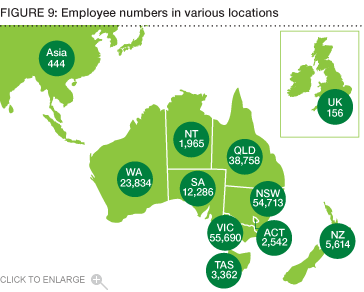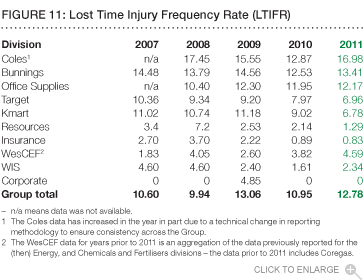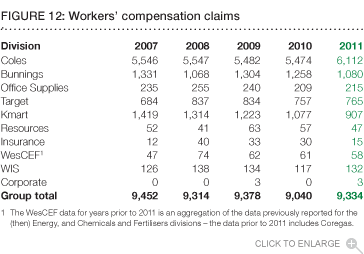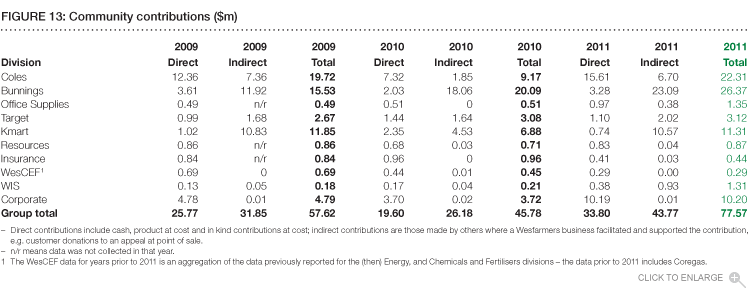Sustainability scorecard
Social
Our people
The majority of our workforce is located in Australia and New Zealand (see figure 9), and our employees worked
more than 218 million hours (figure 10).
In terms of workplace relations, we recognise the right of those we employ to negotiate either individually or collectively, with or without the involvement of third parties. The large majority of our employees are covered by collective agreements. At the same time, the company believes in maximising the flexibility of workplace arrangements available to employees and their managers.
A diverse workforce is of significant social and commercial value and Wesfarmers recognises the importance of being an inclusive employer. Gender diversity has been and continues to be a priority for the Group. As at 30 June 2011, approximately 57 per cent of our employees are female.

Two of our eight non-executive directors (25 per cent), 22 per cent of Wesfarmers' senior executives (general manager level or above), and 26 per cent of all management and professional employees across the Group are female. A copy of our diversity policy is available on our website at www.wesfarmers.com.au
Given our autonomously operating business unit structure, training is one of the key human resource issues within the direct responsibility of business units. At the same time, key human capital development policies and processes apply across the Group. These include remuneration policies for the Group's senior managers, workplace anti-discrimination and succession planning. Our recorded commitment in training and development was 2.2 million hours.
We have a Code of Ethics and Conduct that covers employee behaviour and while business units are encouraged to adopt standards that align best with their activities, these must embody the principles laid down in the Group code, which is available on our website. Also available on our website is our Group Whistleblower Policy which encourages employees to raise any concerns and report instances of unethical, illegal, fraudulent or undesirable conduct, where there are reasonable grounds to suspect such conduct, without fear of intimidation, disadvantage or reprisal.
Safety
Workplace safety remains the Group's highest priority. We believe we have an obligation to do all we can to ensure the safety in the workplace of everyone who works for our company, our visitors and customers. Sadly, the death of a contract worker in a single light vehicle accident at the Curragh mine in August 2010 is a reminder that we must continue to focus on preventing workplace accidents. We have a Group target of reducing accident rates by 50 per cent each year towards a goal of zero. The primary measures are the Lost Time Injury Frequency Rate (LTIFR) and the Total Recorded Injury Frequency Rate (TRIFR).

For the reporting period, the Group LTIFR was 12.78, up from 10.95 for the previous year. Most of this reported increase was due to a change in LTIFR calculation in Coles to standardise the reporting definitions across the Group, although Bunnings and WesCEF reported increases in LTIFR as well. The TRIFR at year end was 40.94, compared to 49.3 in July 2010, although some of this decrease is attributable to standardising our reporting of TRIs across the Group.
There were 2,796 Lost Time Injuries (LTIs) over the year across all businesses in the Group and 8,959 Total Recorded Injuries (TRIs), which include LTIs and medical treatment injuries.

Details of individual business safety outcomes are found in figure 11 and their individual sections of this report. While the LTIFR remains the main Group-wide measure of safety performance currently, operating businesses are encouraged to use a range of broader measures to promote a more pro-active approach and support a culture of safe work practices.
The number of workers' compensation claims is shown in figure 12.
Governance
The corporate governance framework of Wesfarmers operates according to a series of governance charters and policies which have been adopted by the Board. A detailed account of the governance structure and responsibility of Wesfarmers Limited, including the role and responsibilities of the Board, can be found in our 2011 Annual Report or in the corporate governance section of the company's website at www.wesfarmers.com.au
Community contributions and partnerships
The continuing successful operation of the Group's businesses, in an ethical and socially responsible way, is the cornerstone of our contributions to the community. We believe in supporting the communities in which we operate by direct and indirect assistance to organisations and activities that provide a public benefit. The Wesfarmers Board gives preference to activities focused on medical research and health, indigenous partnerships, education and the Wesfarmers Arts program. In this report, further information on the Group's response to the Queensland floods is outlined in some detail. Reference is also made to the support provided to the rebuilding efforts in Christchurch, New Zealand, after major earthquakes. This crisis response was predominantly responsible for the increase in direct community support through cash donations by Wesfarmers Limited from $3.70 million in 2009/10 to $10.19 million in 2010/11.

Figure 13 provides detailed data on our direct and indirect community partnerships and contributions during 2010/11.
In 2010/11, our direct community contributions were 1.05 per cent of earnings before interest and tax ($3.232 billion) and 1.76 per cent of net profit after tax ($1.922 billion).
To ensure consistent reporting on our Group community contributions, Wesfarmers continued to engage with the London Benchmark Group (LBG). The LBG operates an assessment and verification process for organisations wishing to define their community contributions according to standard definitions and policies that are developed collaboratively by the LBG and its members. More information about the process is available at the LBG website (www.lbg-australia.com).
LBG undertakes a verification process across the Wesfarmers Group (excluding Home Improvement and Office Supplies division) and provides a report on which the data in figure 13 is based, as well as a verification statement on page 69. The community contributions from the Home Improvement and Office Supplies (HIOS) division were assured by Net Balance as part of its overall assurance of this report – please note its Assurance Statement on page 70 for specific comment on HIOS' community contributions.
Wesfarmers Arts
The award winning Wesfarmers Arts program provides major ongoing support to a number of premier Australian arts companies. Wesfarmers' sponsorship of the arts focuses on increasing community access to premier quality arts from Australia and the world in the belief that a vibrant cultural sector makes a positive contribution to the lives of all Australians.
Highlights of the Wesfarmers Arts program included the first tour to regional Western Australia by the Australian Chamber Orchestra and the successful roll-out of the Wesfarmers Arts Indigenous Fellowships in partnership with the National Gallery of Australia. The only professional development and mentoring scheme of its kind in Australia, the Fellowships program provides opportunities for 12 indigenous Australians to work with the collections and professional staff of the National Gallery. In September 2011, the program was recognised by an Australian Business Arts Foundation Award for Innovation.
In addition to the arts support program, the company's nationally recognised Collection of Australian Art is shared with the public through exhibitions and loans to galleries across the country.
Responsible sourcing
While the majority of our expenditure on products, employee costs and services is in Australia and New Zealand, many of our businesses source products from other countries, predominantly in Asia and India, but also from Europe, Africa and South America. In our industrial businesses, this sourcing is mainly complex engineering products, bulk fertilisers and chemicals or other raw materials. One of these raw materials, phosphate rock (a key input for superphosphate manufacture) is from a mine in Western Sahara (where WesCEF buys about three per cent of the mine output) and is the subject of international comment in relation to the status of the indigenous Saharawi people of the region. We have reported on this in previous reports and the WesCEF section of this report provides a brief update on our approach.
In September 2011, Kmart ceased supply arrangements with an Indonesian paper company to source envelopes shown to contain less than 20 per cent of tropical hardwood pulp. Kmart is now in the process of reviewing similar paper products in light of these findings.
Most of our sourcing of products from other countries is undertaken by our retail businesses and Wesfarmers Industrial and Safety. Each of these businesses has detailed policies and codes that govern their responsible sourcing activities in other countries, whether the sourcing is directly through manufacturers working for our businesses, or indirectly through other suppliers. These policies and codes are supported by extensive audit and review systems conducted either by our businesses themselves, or through relying on mutual accreditation audit systems with other international retailers. Each business provides some detail on their approach to responsible sourcing in their section of this report and our progress in this area is regularly reported to the Wesfarmers Board.
At 30 June 2011 we had approximately 2,573 direct importers across the Group and during the year 1,147 of these (44.6 per cent) had been engaged in our verification or audit processes. A total of 1,377 audit processes were undertaken during the year, of which 808 were completed either by our own staff or qualified auditors acting directly for our businesses. The purpose of the audits is generally to check compliance and work with suppliers to rectify any issues found, but during the year one manufacturer supplier to Target (and reported in Target's section of this report) was deregistered due to poor social compliance.
Political donations
Wesfarmers does not make donations to political parties.

The musicians of West Australian Symphony Orchestra at home in the Perth Concert Hall.





